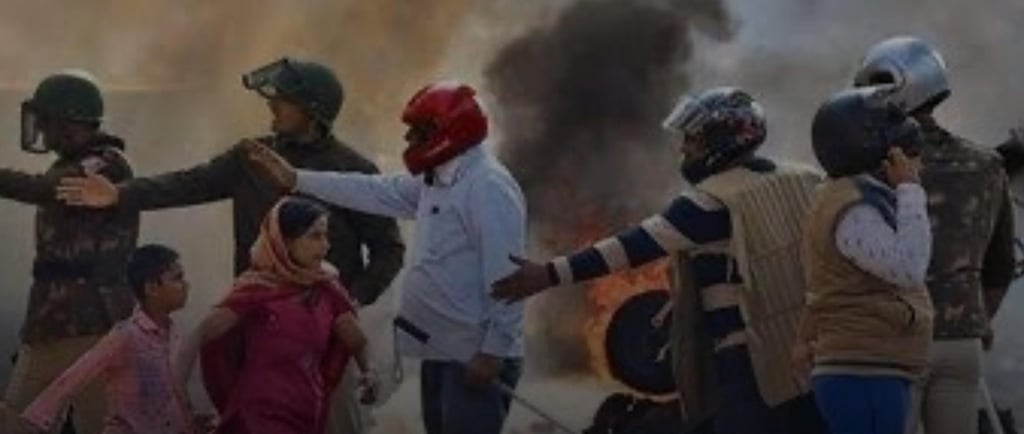Delhi Riots 2020: Court Orders FIR Against SHO for Alleged Police Brutality and Religious Insults.
In a landmark order, Magistrate Udbhav Kumar Jain of the Karkardooma Court has directed the registration of a First Information Report (FIR) against the Station House Officer (SHO) of Jyoti Nagar Police Station, Mr. Tomar, for his alleged involvement in police brutality during the 2020 Delhi riots. The FIR has been ordered under Sections 295-A (deliberate and malicious acts intended to outrage religious feelings), 323 (voluntarily causing hurt), 342 (wrongful confinement), and 506 (criminal intimidation) of the Indian Penal Code (IPC).
2/2/20253 min read


The case, titled Mohd. Waseem vs. State through SHO & Ors., revolves around a complaint filed by Mohd. Waseem, who alleged severe misconduct by police officials during the communal violence that erupted in North-East Delhi in February 2020. According to Waseem, he had left his home on February 24, 2020, in search of his mother amid the chaos when he witnessed Bharatiya Janata Party (BJP) leader Kapil Mishra allegedly leading an unlawful assembly and firing at protestors.
Waseem stated that as tensions escalated, police began firing tear gas shells into the crowd, creating thick clouds of smoke. While attempting to flee the volatile scene, Waseem fell and was subsequently apprehended by police officers. Shockingly, he alleged that the officers, acting under the SHO’s instructions, brutally assaulted him and other injured individuals. The police reportedly forced them to chant slogans such as “Jai Shri Ram,” “Vande Mataram,” and to sing the national anthem—actions that the court later identified as indicative of religious hatred and intimidation.
Further, Waseem claimed that after the assault, he and his father were coerced into signing documents containing content they had not authored. They were also compelled to make statements to the media under duress, allegedly to align with the police’s version of events. According to Waseem, all of this was done under the direct supervision of the SHO, Mr. Tomar.
Waseem’s attempts to seek justice initially went unanswered. Despite sending complaints via email to senior police officials and the National Human Rights Commission of India (NHRC), no action was taken. Frustrated by the inaction, he approached the court under Section 156(3) of the Criminal Procedure Code (CrPC), which empowers magistrates to direct the police to register an FIR and initiate an investigation if a cognizable offense is apparent.
Upon reviewing the case, the court found glaring discrepancies in the Action Taken Report (ATR) submitted by the police. The ATR, rather than addressing the allegations, largely dismissed Waseem’s claims without providing any substantial evidence of a proper preliminary inquiry. The report was conspicuously silent on key points, including the existence of CCTV footage from the day of the incident—a critical piece of evidence that the investigating officer (IO) failed to examine or even mention.
Moreover, the ATR failed to address the allegations against a former Member of the Legislative Assembly (MLA), who was reportedly involved in the incident. The court noted that the IO seemed more invested in shielding police officials from scrutiny rather than conducting an impartial investigation. This led the court to direct Waseem to approach a designated MP/MLA court to pursue legal action against the former legislator.
In a strongly worded observation, Magistrate Jain criticized the police for what appeared to be a deliberate attempt to cover up the incident. The court emphasized that the actions of the SHO and the other unidentified police officers could not be shielded under the pretext of official duties. According to the court, the alleged offenses—ranging from wrongful confinement to religiously motivated hate crimes—did not fall within the scope of acts carried out in the discharge of official duties. Hence, no prior sanction was required to prosecute the accused officers.
The court further instructed the current SHO of Jyoti Nagar Police Station to assign a responsible officer, not below the rank of Inspector, to investigate the matter thoroughly. The officer is expected to identify the roles played by other police personnel involved in the incident and to ensure that the investigation remains unbiased and transparent.
This ruling underscores the judiciary’s critical role in upholding the rule of law, especially in cases where law enforcement agencies themselves are accused of misconduct. The court’s decision also highlights the need for accountability within the police force and reinforces that no one, regardless of their position, is above the law.
In conclusion, this case reflects the ongoing challenges related to police accountability and communal violence in India. It serves as a reminder that the pursuit of justice often requires persistent effort, especially when state machinery is implicated in wrongdoing. The court’s directive to register an FIR against a senior police officer marks a significant step toward addressing the alleged violations of human rights and ensuring that justice is served.
